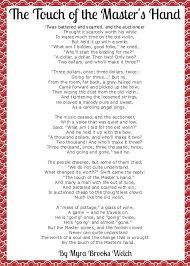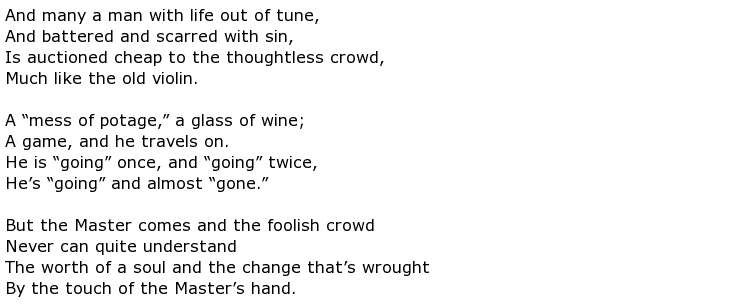 Little is known about the life and history of Myra Brooks Welch. She is popularly known for a single, powerful work of poetry, The Touch of the Master’s Hand, which has appeared in numerous anthologies over the years and been quoted by many, particularly those on the pulpit. Born in 1877 she is said to have written 3 collections of poetry which were published by Brethren Publishing House and were largely religious in nature though you would be hard pressed to find a copy of any.
Little is known about the life and history of Myra Brooks Welch. She is popularly known for a single, powerful work of poetry, The Touch of the Master’s Hand, which has appeared in numerous anthologies over the years and been quoted by many, particularly those on the pulpit. Born in 1877 she is said to have written 3 collections of poetry which were published by Brethren Publishing House and were largely religious in nature though you would be hard pressed to find a copy of any.
Indeed, it is for her work The Touch of the Master’s Hand that she received much of her acclaim. It was published anonymously in the Gospel Messenger around 1921 and was subsequently reproduced, again often anonymously, over the years. According to the story, she wrote the poem in just half an hour when she heard someone giving a speech and its fame spread from there once it was published. Her name was attached to the work in later years when her son attended a religious convention and heard it being read out on stage.
Welch, for much of her life, had suffered from severe arthritis and was wheelchair bound, and she always believed that the words had been given to her by God. She wrote with two pencils in her painfully deformed hands something that must have been excruciatingly painful for her. Whilst the poem is often seen within a religious context it has also been an inspirational composition for more secular thought.
The poem begins with an old, scarred violin at an auction where there are few bidders who are willing to spend any money on it. When a man moves from the back and picks up the instrument and plays an elegant tune on it, the price suddenly rockets up to thousands. The moral of the story is about the worth of a man’s soul under the masterful hand of God which is expressed in the last three stanzas of the poem:

The poem itself points at the worth and potential of everyone, whether they are old and scarred or young and still with possibilities ahead. Many religious leaders see it as an apt metaphor for the sinful individual who has wasted their life but is saved at the last moment by the hand of a loving God.
Whilst Welch may have written many other poems, though little remains of her other works, it is this one single offering for which she is solely remembered. She lived most of her life in La Verne, California, and is thought to have died around 1950 at the age of 72.

